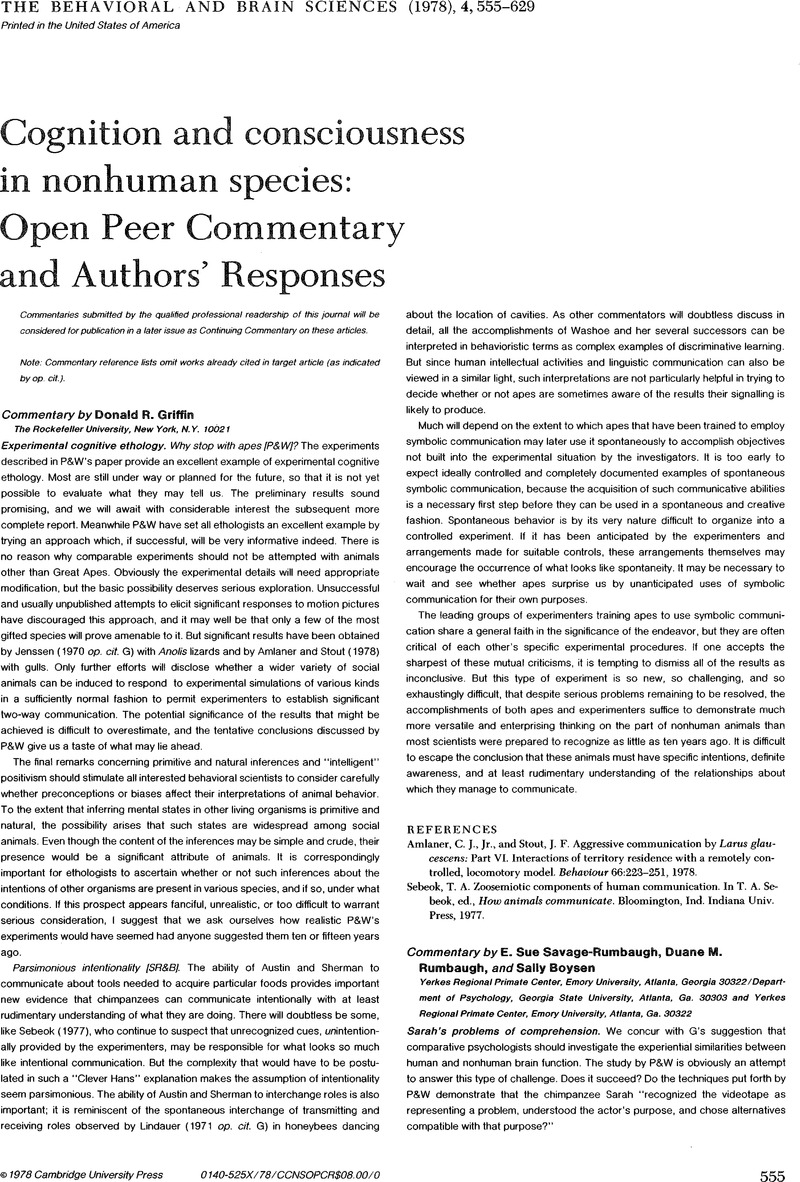Crossref Citations
This article has been cited by the following publications. This list is generated based on data provided by Crossref.
Umiker-Sebeok, Jean
and
Sebeok, Thomas A.
1980.
Speaking of Apes.
p.
1.
Seidenberg, Mark S.
1983.
Steps toward an ethological science.
Behavioral and Brain Sciences,
Vol. 6,
Issue. 3,
p.
377.
Humphrey, Nicholas
1983.
Theadaptivenessofmentalism?,.
Behavioral and Brain Sciences,
Vol. 6,
Issue. 3,
p.
366.
Roitblat, H. L.
1983.
Intentions and adaptations.
Behavioral and Brain Sciences,
Vol. 6,
Issue. 3,
p.
375.
Ghiselin, Michael T.
1983.
Lloyd Morgan's canon in evolutionary context.
Behavioral and Brain Sciences,
Vol. 6,
Issue. 3,
p.
362.
Beatty, John
1983.
Rationality: putting the issue to the scientific community.
Behavioral and Brain Sciences,
Vol. 6,
Issue. 3,
p.
355.
Rosenberg, Alexander
1983.
Content and consciousness versus the International stance.
Behavioral and Brain Sciences,
Vol. 6,
Issue. 3,
p.
375.
Lloyd, Dan
1983.
The scope and ingenuity of evolutionary systems.
Behavioral and Brain Sciences,
Vol. 6,
Issue. 3,
p.
368.
Smith, J. Maynard
1983.
Adaptation and satisficing.
Behavioral and Brain Sciences,
Vol. 6,
Issue. 3,
p.
370.
Churchland, Patricia Smith
1983.
Dennett' instrumentalism: A frog at the bottom of the mug.
Behavioral and Brain Sciences,
Vol. 6,
Issue. 3,
p.
358.
McFarland, David
1983.
Intentions as goads.
Behavioral and Brain Sciences,
Vol. 6,
Issue. 3,
p.
369.
Simon, Thomas W.
1983.
Language in Primates.
Vol. 11,
Issue. ,
p.
97.
Dawkins, Richard
1983.
Adaptationism was always predictive and needed no defense.
Behavioral and Brain Sciences,
Vol. 6,
Issue. 3,
p.
360.
Ristau, Carolyn A.
1983.
International plovers or just dump brids?.
Behavioral and Brain Sciences,
Vol. 6,
Issue. 3,
p.
373.
Hell, John
1983.
Belief accripton, parsimony, and rationality.
Behavioral and Brain Sciences,
Vol. 6,
Issue. 3,
p.
365.
Harman, Gilbert
1983.
Adaptationist theorizing and intentional system theory.
Behavioral and Brain Sciences,
Vol. 6,
Issue. 3,
p.
365.
Jolly, Alison
1983.
Dennett's “Panglossian paradigm”.
Behavioral and Brain Sciences,
Vol. 6,
Issue. 3,
p.
366.
Eldredge, Niles
1983.
A la recherche du docteur Pangloss.
Behavioral and Brain Sciences,
Vol. 6,
Issue. 3,
p.
361.
Bennett, Jonathan
1983.
Cognitive ethology: Theory or poetry?.
Behavioral and Brain Sciences,
Vol. 6,
Issue. 3,
p.
356.
Dennett, Daniel.C
1983.
Taking the intentional stance seriously.
Behavioral and Brain Sciences,
Vol. 6,
Issue. 3,
p.
379.



